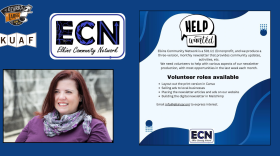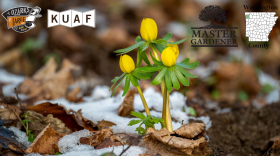Last year Matthew Holden - a science teacher at Fayetteville High School - and Brittany Berry - an EAST facilitator at Helen Tyson Middle School in Springdale - were selected for the Grosvenor Fellowship from the National Geographic Society. As part of their fellowship, both teachers traveled to Antarctica for an expedition led by National Geographic over their winter break. We spoke with the two once they returned about the journey and how they are bringing what they learned into the classroom.
The following is an edited transcription of that conversation.
Matthew Holden: It really just blew away all the expectations that I had had, I knew it was going to be amazing. But I had no idea how amazing and how phenomenal it was very surreal. Sometimes I still feel like was it really happening? It was just unbelievable the people that we were able to interact with from around the world and learn from, and obviously the wildlife was just a truly, once in a lifetime, phenomenal experience.
Brittany Berry: Yeah. And I think Matt hit on a really interesting part of it. And that is the people part. So you know, you have the other guests on ship, you had the National Geographic Lindblad staff. So the naturalists and the photographers and all of those individuals, those relationships, it was really a blessing.
Daniel Caruth: Everybody kind of has an idea of what, like, in my mind, now I'm envisioning what that looks like to be on a ship in the Antarctic and going through this landscape. What kinds of things were you learning? What sort of lectures were you going to? What were you able to see and interact with?
BB: I think for me, kind of that like, transformational aha moment was our first day in Antarctica, and it was kind of gray and overcast and it was snowing. And you went outside and you were like, This is as close to space as I'm ever gonna get. It is other worldly. It does not. To me, that's like the takeaway is it really is like no other place you could ever possibly go.
DC: And then as far as the learning aspect of it, what were were some of the like lectures that you were a part of what was the focus of your expedition?
MH: So, the naturalist onboard all specialized in different aspects that might be beneficial to the expedition and the environment and wildlife and region. So we had some undersea experts that would dive down and show us all about the marine life. We had experts on birds, specifically on penguins, we had experts on pinnipeds. And a botanist, and a botanist, one plant was a very exciting moment. For him, we saw one flowering plant on ours as well. And it was really neat. While I was there, I took some equipment with me to measure water quality samples. So on every outing, whether it was on a Zodiac or on a landing, I would collect water samples, and then analyze them for things like pH level, dissolved oxygen, nitrate, and phosphate, things that can be found in runoff, or from human activities. And then I was also able to collect some samples and analyze for microplastics, which I do a lot in my own classroom. And unfortunately, we did find microplastics, even down in Antarctica.
BB: Matt and I both are also doing a small pilot with National Geographic. So they sent us with 360 cameras. So we're going to be building some kind of like immersive content, what are the interesting things that I'm posing to my students? Because we've even been discussing like, at what point do we say, should people even go to Antarctica? You know, are there places that should be left alone and unexplored in our own backyard? And that's part of kind of the curricular focus.
DC: I Imagine a lot of these projects are coming out of this experience. But I imagine you would have been doing similar projects or something with your class. Regardless. So do you feel like this trip this expedition has helped you or given you more tools to be able to do that work better or more efficiently or with a bigger network?
MH: I think that the people that I've met and also just meeting Brittany has provided me with so many more resources than I had prior to this experience. I'm learning about all sorts of new immersive technology that I've never had any experience with before and I can't wait to get that into my classroom and have my students get to explore the world using that.
BB: I think I come back a lot to the quote, "people love what they can understand and they protect what they love." And so we're working on getting our students to really understand how what happens here has a much broader impact on the world and getting them to understand why they should care about Antarctica, right? It's a place really far away that that probably most or all of them might never go in it until they understand it. They can't love it and till they love it. They're not going to be as invested in protecting it.
DC: All right, finally, guys, the real hard hitting question, what was the best thing the best animal experience maybe that you saw on the trip or anything, you know, any kind of wild experience that you had that you were in love?
MH: So I know on our previous interview, I told you I was really hoping to see a blue well. We did see a blue well blow out Water through its blowhole from a distance, but we weren't actually able to see the animal itself. So probably the best wildlife experience I got was seeing a pod of about 17 orcas. It was a beautiful sunny day, the water was super calm, it looked like glass and they just circled the boat for about 30 minutes. We just got to sit there and take in the wander. It was just unbelievable.
BB: It is very cliché. I mean, the penguins are just so stinking cute. And so to watch them waddle or porpoising penguins and them just like darting through the water,
MH: And they're not afraid of you. They have no land predators. So they'll walk right up to you. So you got to walk away.
BB: Yeah, you really gotta distance from the penguins. So you're like, you know, you're backing up and they have their little penguin highways and you got to make sure there's plenty of room for them to get through. That's definitely been the most popular with my students.
DC: All right, well, Matt, Brittany, anything else you guys wanted to add or say or think people should know?
MH: Be on the lookout for our talk, hopefully this summer, at the Fayetteville Public Library and please reach out if you have any questions about our experience, or if you're interested in participating in the fellowship yourself.
BB: I'll just do a shameless National Geographic plug as someone who just loved the magazines as a kid, look at the world. It is really an amazing place.








